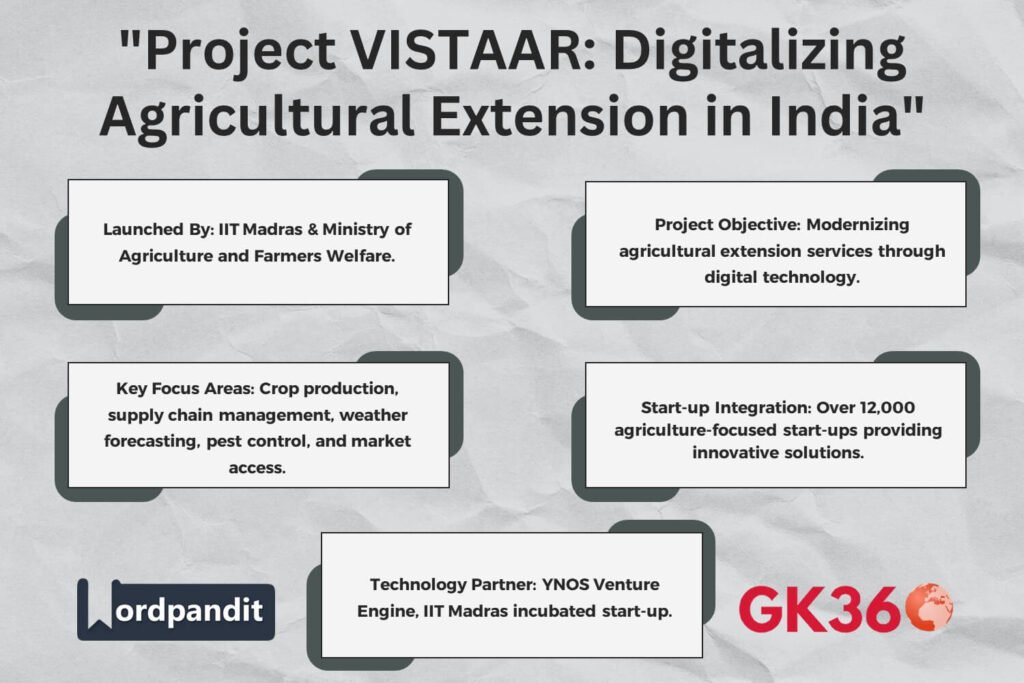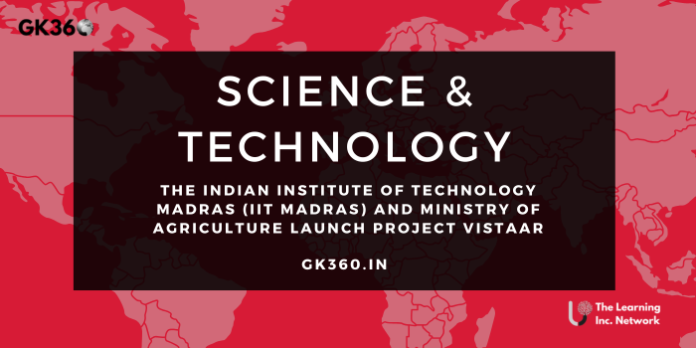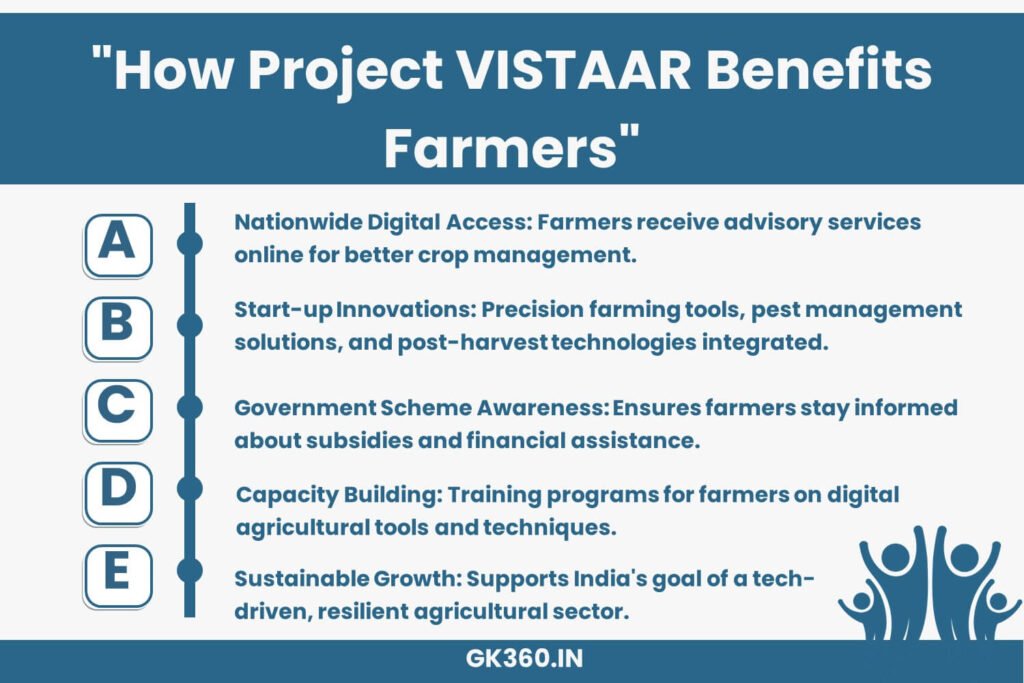IIT Madras and Ministry of Agriculture Launch Project VISTAAR to Digitalize Agricultural Extension
Introduction
The Indian Institute of Technology Madras (IIT Madras), in collaboration with the Ministry of Agriculture and Farmers Welfare, has introduced Project VISTAAR (Virtually Integrated System to Access Agricultural Resources). This initiative is designed to modernize India’s agricultural extension system by leveraging digital technologies. The project aims to bridge the gap between farmers and advanced agricultural solutions, ensuring improved access to advisory services, government schemes, and technological innovations.

Table of Contents
- Enhancing Agricultural Extension through Digitalization
- Leveraging Start-up Innovations for Agricultural Transformation
- Strengthening Farmer Access to Technology and Advisory Services
- Fostering Collaboration for a Digitally Empowered Agricultural Sector
- Key Highlights of Project VISTAAR
- FAQs
- Conclusion
Enhancing Agricultural Extension through Digitalization
Project VISTAAR aims to empower farmers by integrating modern technologies into agriculture. Key focus areas include:
- Digitalizing advisory services in crop production, marketing, value addition, and supply chain management.
- Providing real-time access to weather forecasts, pest management strategies, and sustainable farming techniques.
- Enhancing farmer awareness of government schemes related to agriculture and rural development.
Leveraging Start-up Innovations for Agricultural Transformation
Start-ups play a pivotal role in enhancing agricultural productivity. IIT Madras, through its Centre for Research on Start-ups and Risk Financing (CRSF) and its incubated start-up YNOS Venture Engine, has developed a database of over 12,000 agriculture-focused start-ups. This database will:
- Connect farmers with cutting-edge agricultural innovations.
- Facilitate access to precision farming tools, post-harvest management solutions, and crop disease monitoring systems.
- Enable technology-driven solutions to enhance farm profitability and sustainability.
Strengthening Farmer Access to Technology and Advisory Services
The partnership between IIT Madras and the Ministry of Agriculture ensures that farmers can access high-quality advisory services. The initiative will:
- Improve digital extension services for farmers in remote areas.
- Provide guidance on best farming practices, sustainable techniques, and market trends.
- Enhance decision-making capabilities by offering real-time agricultural data and insights.
Fostering Collaboration for a Digitally Empowered Agricultural Sector
Project VISTAAR emphasizes collaboration among stakeholders, including:
- Start-ups, researchers, policymakers, and farmers, to drive technological adoption.
- Capacity-building programs to train farmers in digital agricultural tools.
- Reducing information asymmetry to enhance efficiency and productivity.
Key Highlights of Project VISTAAR
| Why in News? | IIT Madras and the Ministry of Agriculture launched Project VISTAAR to digitalize agricultural extension. |
| Project Name | VISTAAR (Virtually Integrated System to Access Agricultural Resources) |
| Objective | Modernizing agricultural extension services using digital technology. |
| Key Collaboration | IIT Madras and Ministry of Agriculture and Farmers Welfare. |
| Start-up Database | Over 12,000 agriculture-focused start-ups integrated into the platform. |
| Focus Areas | Crop production, supply chain management, marketing, value addition, and scheme dissemination. |
| Technology Partner | YNOS Venture Engine, an IIT Madras incubated start-up. |
| India’s Agriculture Minister | Shri Shivraj Singh Chouhan |
| IIT Madras Location | Chennai, Tamil Nadu |
| Static Data | Tamil Nadu – CM: M.K. Stalin; Governor: R.N. Ravi; Capital: Chennai. |
FAQs
- What is Project VISTAAR?Project VISTAAR is a digital initiative by IIT Madras and the Ministry of Agriculture aimed at modernizing agricultural extension services through technology-driven solutions.
- How will Project VISTAAR benefit farmers?The project provides real-time advisory services, access to advanced farming techniques, and connections with innovative agricultural start-ups, helping farmers make informed decisions.
- How does Project VISTAAR integrate start-ups?A database of over 12,000 agriculture-focused start-ups has been integrated to connect farmers with innovative technologies and solutions.
- What role does IIT Madras play in the project?IIT Madras, through its Centre for Research on Start-ups and Risk Financing (CRSF) and YNOS Venture Engine, is spearheading technological integration and research.
- What are the key focus areas of Project VISTAAR?The project emphasizes digital advisory services, supply chain management, weather forecasts, pest control, and sustainable farming techniques.
Conclusion
Project VISTAAR is a revolutionary step in India’s agricultural transformation, leveraging digital technology, start-up innovations, and government support to create a sustainable and resilient agricultural sector. By ensuring farmers have timely, accurate, and technology-driven insights, the project paves the way for a digitally empowered agricultural industry.
Key Takeaways Table
| Project Name | VISTAAR (Virtually Integrated System to Access Agricultural Resources) |
| Initiated By | IIT Madras & Ministry of Agriculture and Farmers Welfare |
| Objective | Digitalizing agricultural extension services in India |
| Key Technology Partner | YNOS Venture Engine, an IIT Madras incubated start-up |
| Start-up Database | Over 12,000 agriculture-focused start-ups integrated |
| Focus Areas | Crop production, supply chain, weather forecasts, pest control, and market trends |
| Launch Date | 2025 (Announced on IIT Madras platform) |
| India’s Agriculture Minister | Shri Shivraj Singh Chouhan |
Relative Terms
- IIT Madras Project VISTAAR
- Digital Agricultural Extension India
- VISTAAR Agriculture Technology Initiative
- Ministry of Agriculture Digital Reforms
- Start-up Innovation in Indian Farming
- Smart Farming Advisory Services India
- Government Schemes for Farmers 2025
- Sustainable Agriculture Digitalization
- YNOS Venture Engine IIT Madras
- Indian Agriculture Modernization 2025






